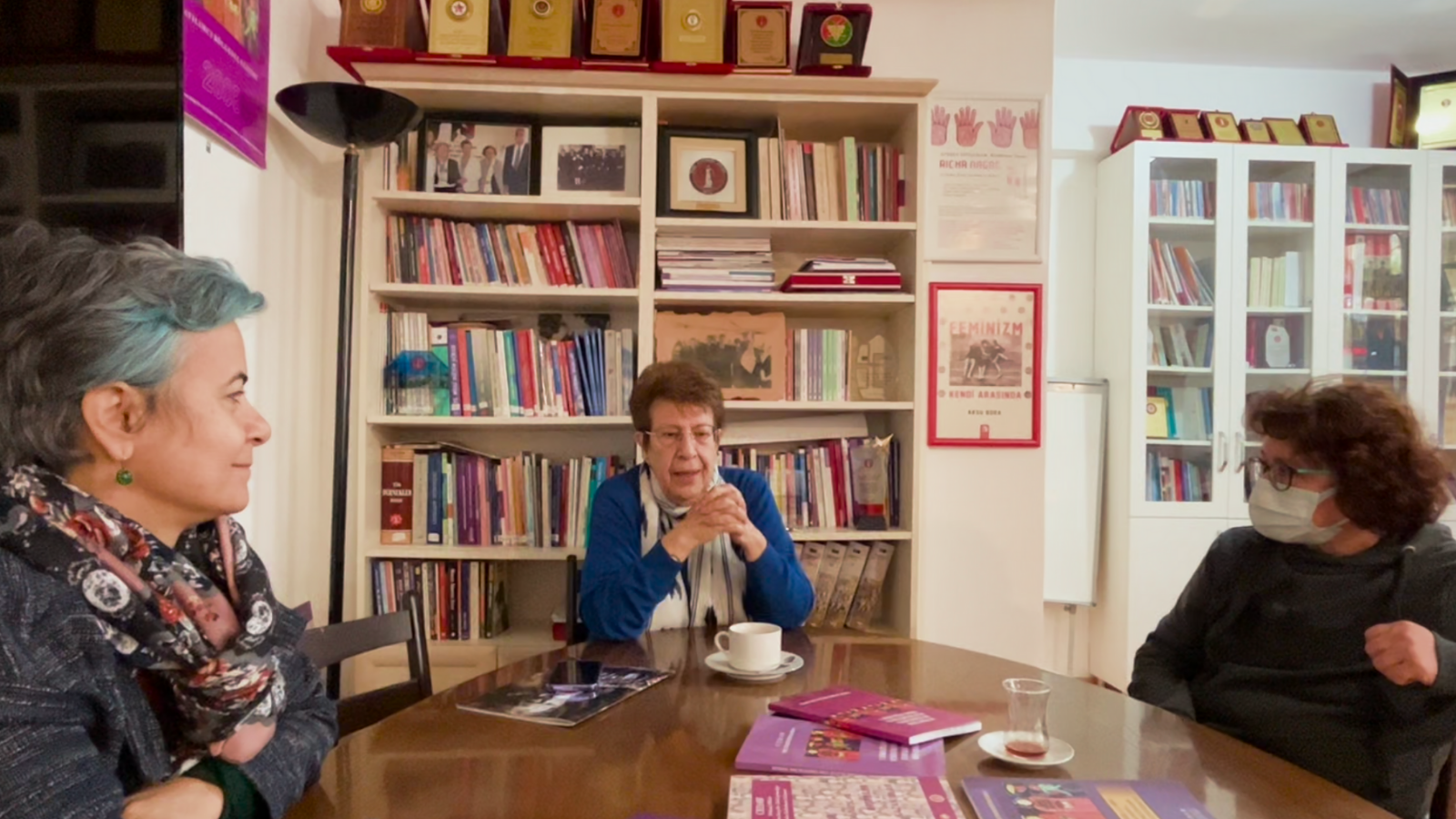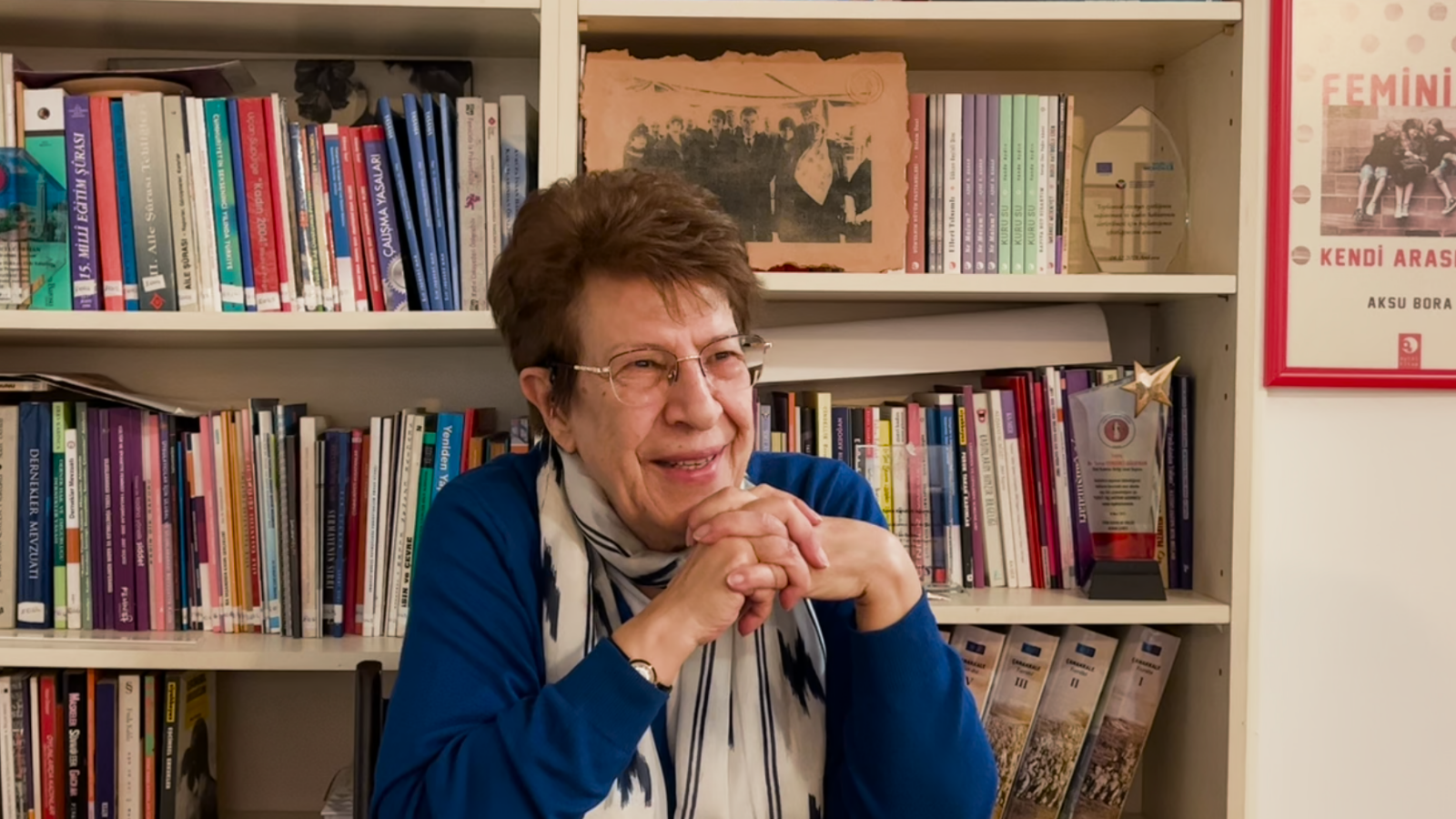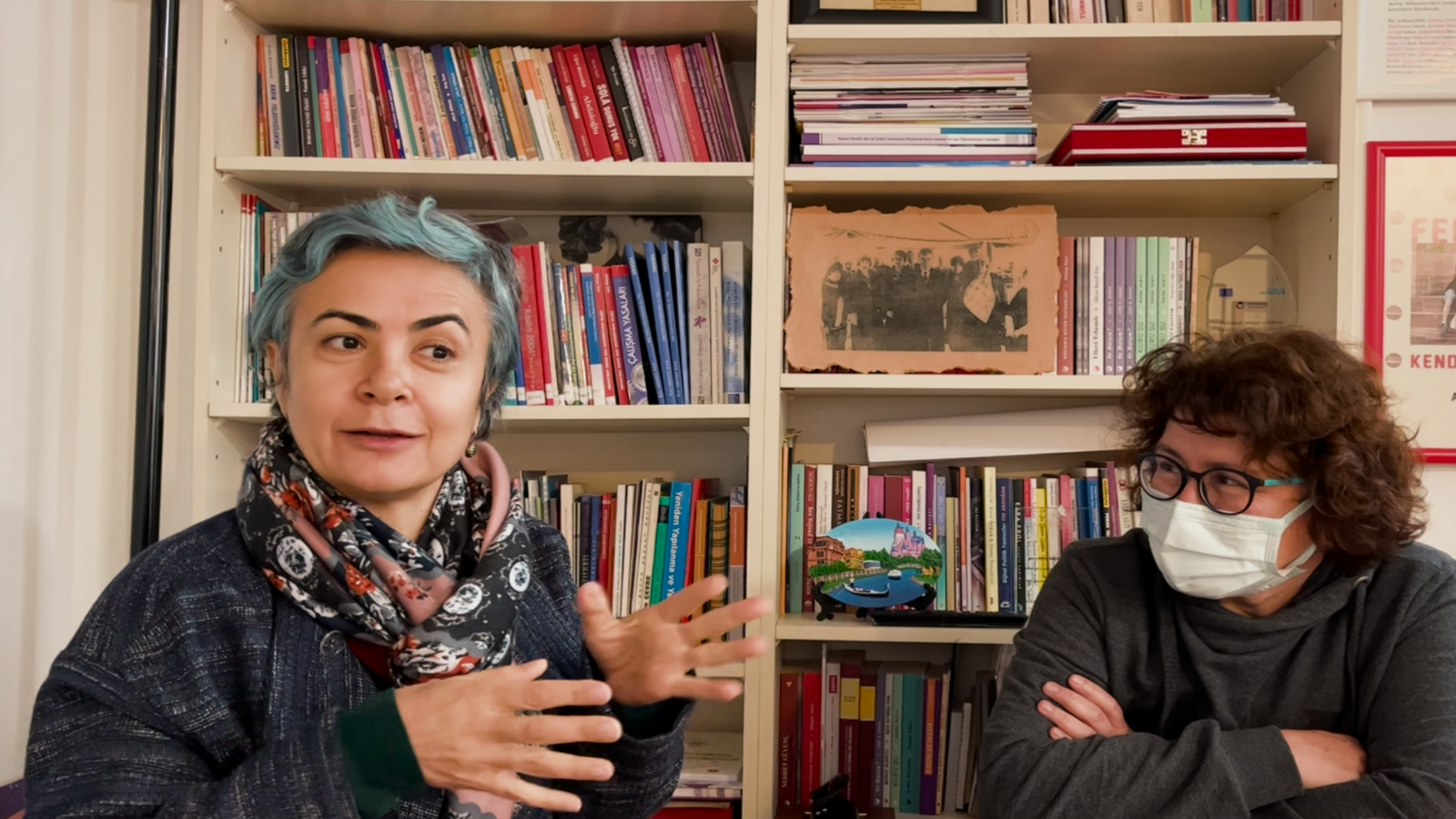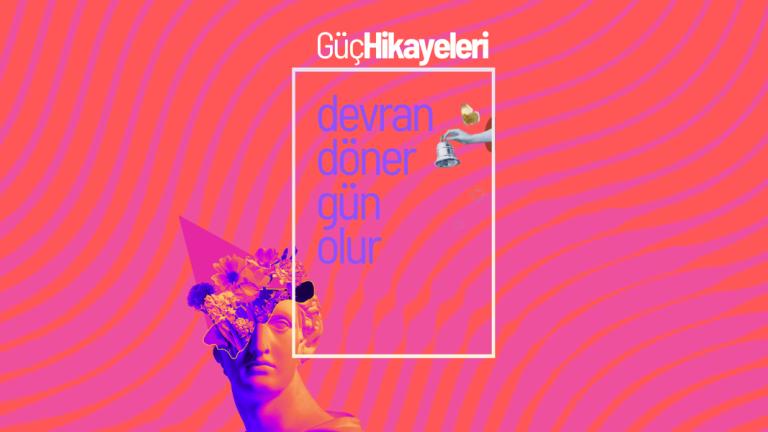
Experiences with the CEDAW Committee Meeting as an International Participation Mechanism: Turkish Women's Union
The Convention on the Elimination of All Forms of Discrimination against Women, or CEDAW, is one of the nine major conventions of the United Nations. With the emergence and contributions of the second wave of the women's movement, Turkey signed the Convention in 1985 and brought it into force by publishing it in the Official Gazette in 1986.
The women's movement in Turkey tries to regulate the domestic law in accordance with the requirements of the Convention, monitors the state on the one hand, collects data from the field, records the actual events with a shadow report, and tries to contribute to the recommendations of the Convention according to the needs. While States Parties submit their country report to the CEDAW Committee every 4 years, the CEDAW Civil Society Steering Committee prepares a shadow report as part of the Convention's monitoring mechanism.
The Turkish CEDAW Civil Society Steering Committee was in Geneva last June for the 82nd session of CEDAW, where Turkey is being reviewed for the eighth time. In the meeting, which was attended by the delegation of representatives from ministries and relevant institutions, as well as Minister of Family and Social Affairs Derya Yanık, the Turkish CEDAW Civil Society Steering Committee, which is composed of women's and LGBTI+ organizations, reported on both what actually happened from the civil society perspective and the lobbying efforts during the meeting.
We spoke with Sema Kendirci Uğurman, Huriye Karabacak and Demet Erdemir from the Turkish Women's Union about the CEDAW Civil Society Board, whose secretariat is run by the Turkish Women's Union, and the preparatory processes for the meeting.
First, we would like to start with the treaty. Why is the United Nations Convention on the Elimination of All Forms of Discrimination against Women important? What is the status of this convention within the women's movement?
Huriye Karabacak: CEDAW is a very important document for all women, both in Turkey and worldwide, because it is the first legal document that deals with discrimination against women and equality between women and men. Because before CEDAW, the legal system, which claimed objectivity and impartiality, did not see women's human rights and discrimination against women. When this situation arose with the struggle of feminists and women, a separate treaty had to be signed. CEDAW is a document that most countries in the world have joined and is known as the Constitution of Women's Human Rights, and this document is still relevant. CEDAW is one of the most important legal instruments we have, and it is constantly being updated. It is also very important in this respect.
You said that the document updates itself. What influence do the reports published every four years by States and the shadow reports produced by non-governmental organizations have on the updating of this document?
Sema Kendirci Uğurman: By updating, we mean changing the general recommendations of the treaty. For example, there has been an innovation and development on violence. Because violence against women was not in the headlines of CEDAW. Violence against women was later included in the thematic recommendations. Twelve chapters of CEDAW address different areas. Violence against women was not one of these topics. Due to the increase of violence against women in the world, but mainly because it is now defined, general recommendations were made under the title of Violence in CEDAW.
Huriye Karabacak: The CEDAW Committee, which is the monitoring body of the treaty, makes general recommendations on what the provisions of the treaty mean and how they should be interpreted. Through these general recommendations, the convention emphasizes the need and importance of combating violence against women and then gender-based violence, as expressed in recommendation 35, in order to achieve equality between men and women and to eliminate discrimination against women. That is what we mean when we talk about updating. In other words, what the treaty provisions mean, how they are interpreted, and what the parties will do to exercise those rights, that is what they make recommendations about.
These recommendations are shaped by both the review of country reports submitted by countries and the shadow reports submitted by civil society. Again, these changes are influenced by developments in women's rights at both the international and national levels. Therefore, CEDAW is the most widely used and largest instrument in the world that tracks developments in the field of women's rights and transforms them into a recommendation or at least a guideline or manual for implementation.
Sema Kendirci Uğurman: The CEDAW Executive Council has a dual monitoring method. First, it requests an evaluation report from signatory states every 4 years to answer the question, what have you done about CEDAW's monitoring issues? Second, it says to the civil society of the state it is monitoring, you can submit reports to me for all my titles as well as for thematically selected titles.
The monitoring method here has a comparison mechanism. In other words, the state has to report to the committee on its own actions. In other words, by signing this Convention, if there are provisions in their domestic legislation that are in violation of this Convention, States undertake to bring them into conformity with it. So, the question is, in which titles have you brought my provisions into conformity with domestic legislation every four years and in which have you not? This is very serious monitoring. The committee is watching the country, but at the same time saying to civil society, "'Did he really do it?'' You monitor these savings, these transactions, these actions of the state and report to us."
Now, let me add from the beginning what I will also say at the end. The shadow reports that we have produced are really the first and only evaluations of the monitoring reports that have been done so far in Turkey. Because we are directly monitoring the state. The first and most valuable examples of monitoring for our civil society are the shadow reports of CEDAW because they are so well attended.

Photo: Huriye Karabacak, Sema Kendirci Uğurman, Demet Erdemir
In 2010, you said that the relationship with the public has been weakened. Of course, in this process, not only has the relationship with the women's movement weakened, but also with civil society as a whole. During the preparation of the 8th shadow report, did you have a request to contribute to the work of the public?
Sema Kendirci Uğurman: Of course, there was. We wrote a letter. The situation was as follows. Since I am also a member of the Violence Monitoring Committee, which was established in the Ministry of Family Affairs, they invited me. But there were still about 15-20 days before the report was sent out. I then wrote a letter on behalf of the CEDAW Civil Society Executive Board, since we are the secretariat. I said that this invitation was a disgrace. I mean, we should have been doing this work together for a long time. So, are you inviting us to say that we also added our name? We are sorry, we will not participate in any way again. So, you send a huge 300-400-page report and invite me 15 days before. They say, come and contribute. Do not worry about it anymore. As the board of CEDAW Civil Society and I of course as the Turkish Women's Union, we officially wrote a letter saying that we will not participate in something like this. I mean, we have not had any relations at all since then, of course. In other words, our cooperation was no longer included in the shadow report of the 6th term of 2015.

Photo: Sema Kendirci Uğurman
You said that the shadow reports were made with great participation. From this point of view, we would like to hear the story of the Turkish CEDAW Civil Society Board, which was established in 2002, and the story of these 20 years.
Sema Kendirci Uğurman: In 1995, the 4th World Conference on Women was held in Beijing. After 1995, the General Directorate of Women's Status and Problems was established and they wrote and sent official reports on behalf of Turkey to the CEDAW Committee.
Before we participated in CEDAW monitoring, that is, civil society participation on a large scale, I think there was a report prepared by some of our professors in 1998. But our real involvement in civil society monitoring started in the 2000s. Before that, the first, second, and third country reports were sent out.
We, on the other hand, began to wonder how to write this report when we participated in Turkey's fourth and fifth combined reports in 2000. At that time, the Secretariat started with Flying Broom and dear Halime. He was in charge of the first secretariat. In this way, we prepared the combined report for the fourth and fifth terms. But before that, we thought about how to prepare this report, how to get everyone's opinion, and we did a mapping study. We conducted this study to find out where and how many women's organizations there are in Turkey. We identified almost 500 women's organizations from all over Turkey and asked a representative of these organizations to come to Ankara and collaborate on the shadow report. In 2003, 600 women representatives from almost 500 organizations gathered in Ankara and we held workshops on CEDAW issues. At the end of these workshops, we gathered all the opinions and decided to prepare a report in this framework for the first time. Of course, there is something else. Everyone will return to their city, but we also need a team of authors who will work under the umbrella of the Secretariat. At this meeting, we held a vote to determine the team of authors. More than 20 organizations from the hall were nominated for this and as a result of the voting, these friends were elected to the Board of CEDAW Turkish Civil Society. This team prepared the fourth and fifth combined shadow report in Flying Broom Secretariat. This combined shadow report, which we sent in 2005, is the report with the largest participation. After this process, we applied for the secretariat on behalf of the Turkish Women's Union and this application was approved unanimously.
Now we are sometimes twenty, sometimes 26-27, sometimes almost 30. We also changed our methods during the preparation of the reports. For example, during the preparation of the fourth and fifth combined reports, organizations from all over Turkey met in Ankara. In preparing the sixth shadow report, we went to the cities where the organizations were located. For this study, we divided Turkey into seven regions. We identified a central province for these regions and met with women's organizations in these cities. Therefore, the sixth shadow report was prepared with great participation.
Let me make a note here about its application. Every four years, a formal report and a shadow report are sent to the CEDAW Executive Council. But every two years, the Committee asks questions if it thinks it is necessary, and interim reports are sent for that. So, the state and we also send these interim reports. After the report for the sixth term was over, we also sent an interim report. Since that time, violence has been one of the issues that the CEDAW Committee has taken seriously.
In other words, even though we write in the titles of the treaty, we prioritized violence against women and sent it as a separate title. In other words, violence was included in each of our reports, even though it did not have its own title. It was announced later as a title of the treaty.
By the way, let me open a parenthesis, both as Turkish Women's Union and as some organizations that made shadow reports, we also participated in the official report studies of the state in the beginning. They invited us and we participated in the work.
In other words, we were able to work together, not reciprocally. We talked about our criticisms there. But we also said, if you include these titles and our demands in the official report, if you do not, we will write and send them in our shadow reports. That relationship continued until 2010. At least I was one of those who was there until that date. But after 2010, when the relations between the state and civil society deteriorated and the state reduced all relations with civil society to a minimum, we could no longer produce together in the preparation of the seventh and eighth reports. But, of course, this did not hurt us. But I do not mind criticizing them here. They wrote and sent out their reports by the cut-paste method, the sixth, the seventh, and the eighth.
How many people are you currently working with?
Sema Kendirci Uğurman: This table we sit at is a very famous table. We meet every Tuesday at this table and eat cheese and bagel. The Civil Society Board has been meeting at this table every Tuesday for four years and has continued its monitoring. Now, of course, there is a team in Ankara. You know, there is a team that can come to this table. We are 4 or 5 organizations in this situation. We have some organized friends in Istanbul, we have friends in Izmir and we have friends from Diyarbakır. There is a bigger organization. KAMER is one of them. What I am saying is that as we work here, we start to get their opinions, and we distribute the titles to them.
For example, we talk to Mor Çatı in Istanbul and they work with people and institutions that they have chosen, taking up the issue of violence. Here we present the final version together or we talk to Women's Human Rights. In the meantime, of course, the disabled are among us. Kaos GL and LGBTI+s are among us. Recently, refugees have also joined us.
For example, in our 4th and 5th reports, there was no section for refugees. We now know that refugees are a very serious, very important issue. By the way, there is no coverage for all issues. We can choose the topic. For example, in the 4th and 5th report, it was about health. Because maternal and child mortality was at a very high level. But in the 6th report, dear Feride Acar, it says that maternal and child mortality has improved a lot, so you can take another title instead. A few different titles remain basic each semester, but there are also additions. Violence never changes, and neither does our title on legal changes. Why does not it change? Because this is our main criticism. Because you still have not brought your state-oriented domestic law into the treaty form on these points, you have not made new legal provisions in accordance with the treaty, and that's one of the unchanged headings, because the criticism is also fundamental. But it is very interesting that CEDAW does not have a refugee title. But just like violence, they have accepted it. Of course, this issue has become the most important and serious issue for us as well as for the whole world.
Demet Erdemir: In our last shadow report, we summarized this under the heading of intersectional discrimination and wrote about it with the information we received from individual associations about disabled women, LGBT+ and refugees. But all these three titles have too many problems, too many difficulties, so it comes out an incredible report. However, of course, the CEDAW Committee limits the number of words in the report. For example, when I did the report on these three titles, it was 36 pages. So, you are trying to get to the heart of the most important issues in a nutshell. While on the one hand you are trying to express the issues, on the other hand you are trying to convey and communicate through abbreviations. Unfortunately, this is a major dilemma that we are struggling with.
Sema Kendirci Uğurman: The preparation of the 8th report was very difficult. Because it fell in the time of the pandemic and we had to have all our meetings online. But we had a really great participation. We set every topic in these meetings and the organizations in the committee reached out to many organizations in Turkey to prepare the reports on these topics. Despite the pandemic and all the difficulties, an excellent shadow report was produced with the contributions of the organizations.

Photo: Huriye Karabacak ve Demet Erdemir
You participated in the 82nd session of CEDAW last June. What was discussed in that session? What did you do in the hours outside the official session?
Huriye Karabacak: There is a women's organization that facilitates the session to facilitate the process of the committee meetings and to involve civil society in these meetings. They have been helping us. In other words, they informed us about how the meeting is run, how long the meetings last, where they are held, who attends, and what issues are discussed first.
Our main focus at the meeting was to communicate the report we produced to as many people as possible and to make sure that they also take this report into account in their final assessment and share it with the parties.
The representatives of the state parties come to the meeting and make a presentation. There is a long session where they present. We can attend that session as the Executive Committee, but we can only be audience members. As for our presentation, civil society has 1.5 minutes in these sessions to briefly summarize their report. So, you should summarize the entire report in a minute and a half, in the most concise and understandable way, and in a way that highlights the headlines that you want to include in the report. Because some members may have heard it for the first time. There are 189 countries that are parties to the Convention, and if you look at the reports of all the countries, there is a division of labor. There is a rapporteur for Turkey, of course, who knows the most, and a few appointed members may know, others may not. But at the end of the day, it is important that others hear our demands and our report, because they all participate together in the review and decision-making processes.
Outside of that 1.5 minutes, CEDAW Committee members and women's organizations preparing shadow reports can come together for lunch. Over time, through the efforts of civil society here, a luncheon called the "Lunch Briefing" has been won. You can invite the members of the CEDAW Committee to a lunch where you can have a private conversation for an hour and a half. At that lunch, you can present the report, answer the members' questions, and make your requests about what should be highlighted. That's what we did as well. It's interesting, of course, because not everybody may come, but they said that the attendance was very good for Turkey. Based on previous experience and there, we summarized the report in the same way and conveyed our priority wishes.
Apart from this formal process of the meeting, you have the opportunity to talk during the breaks, such as dinner or walking on the street. We even rode the same bus together and talked there as well. Of course, this worked very well, because they do not have time either. But at such times, they asked the prominent topics they were particularly curious about.
The focus of this period was, of course, the exit from the Istanbul Convention. While we thought that CEDAW was "outdated and no longer very functional," I say that in quotes, the opposite occurred with Turkey's withdrawal from the Istanbul Convention. During the withdrawal from the Istanbul Convention, CEDAW was the main tool we had to defend it and continue its implementation as part of the whole. At the meeting, the CEDAW Committee both asked about the reasons for this withdrawal and communicated to the country its concerns about this withdrawal and its return. This was one of the main demands of our shadow report and this was directly reflected in CEDAW's concluding comments.
Demet Erdemir: Also, we were all sitting in the meeting wearing purple masks that said "Istanbul Convention Keeps Alive." That was also very eye-catching.

Who represented the public? I think the representatives of the ministry came?
Huriye Karabacak: There was ministerial participation and the Minister of Family and Social Affairs came. This is a positive thing. Because it means that she takes the issue seriously and is in control of the issue.
Demet Erdemir: One of the things we observed at the meeting was that too much statistical data was mentioned in the presentations.
Huriye Karabacak: The fact that the public drowns their presentation in numbers takes you away from the core of the issue and prevents us from seeing the bigger picture. For example, they talk about their TL payments. But that means nothing to members. He says that so many people receive medical assistance, so many women receive shelter. But if you compare these numbers to the population, it does not make sense. The state uses this numerical data to dodge basic questions and obscure basic obligations. But the data it gives does not meet international standards anyway.
However, one of our most important demands was the collection of data and statistical studies. On this issue, there is a great shortage in Turkey and the state is not working properly. Our reports are full of data and ratios that present the issue more realistically. This was one of the issues that the CEDAW Committee highlighted in its comments. It advised Turkey to collect data on violence against women, explain it and research it.
Did you have the opportunity to speak to the citizens during the meeting?
Huriye Karabacak: Independent human rights institutions and the Ombudsman have the right to make a presentation at the meeting. An official from the Turkish Institution for Human Rights and Equality also attended the meeting. He just made a presentation. Of course, we say that these institutions are not independent and are not structured according to international standards. This was also in our reports. We had the opportunity to talk again about what we said there. For example, we asked what the Ombudsman has done in terms of the withdrawal process from the Istanbul Convention. It also went into this report, and the members of the CEDAW Committee asked about it there as well. Again, we talked to the Ministry of Family and Social Services. It was an opportunity to remind them that they should be invited to the meetings in the country and that we are also working in this area.
Of course, there is a contact there, but the contact there has no influence on the processes in the country, at least not for this period. This was the case before, and after the discussions about the CEDAW reports, various studies were conducted in the country. But for the last period, this is not possible. But as a result, it is good for us to see firsthand what the state says it is committed to, what it is committed to, at least outside the country. Because then we have the opportunity to remind them, to follow them, to ask them to act.
Finally, how did you prepare for your lobbying work?
Demet Erdemir: Before we went to Geneva, we talked to already experienced friends about taking every opportunity. As Huriye just said, there is a reporter who knows and studies Turkey. Instead, of course, you chase after him and try to catch him. Or there was a committee member from Azerbaijan who knew Turkey, so he often came and talked to us. You try to catch the committee members at work as you leave the room, but of course that was the main lunch. I think everybody there had a chance to pour out all their content.
Huriye Karabacak: We had a division of labor before we left. Not only we from Ankara were there, but also friends from Istanbul. Before we left, we decided what we would talk about, who would talk and who would answer what questions in the hour and a half we had. So, we were well prepared to use the time as efficiently as possible. That also worked.
However, as the Turkish Women's Union, we did a project to disseminate CEDAW and we collected some data as part of that project. We included this data in the shadow report. In other words, we are already advocating in our own organizations and at the local level. But at the international level, we have been talking to other organizations in the field and women's organizations and their representatives, and communicating and sharing information with those who will be in the field. Again, we established a dialog with the secretaries and assistants of the committee members, gave them some information and received email addresses. Later, we sent additional reports or messages on current issues. So, we tried to use all communication channels. Of course, on the way back, we also informed other friends we worked with and held joint meetings. We plan to publish these studies as a written book. But at the same time, for example, our project to disseminate CEDAW continues.
In other words, what we have done in Geneva in this project, what has been revealed in this report, what the State Party has committed to do as soon as possible, we are going back and telling everybody. The report has become a work that is interwoven internally and externally, or a tool that is used more every day than it used to be.
Is there anything you would like to add?
Anyone who would like to learn more about our experience and our work in this area can contact us. We are here for you. Thank you.

STGM Studio
We have good news for CSOs that want to produce video content. In our studio in our office, you can shoot your videos and get editing support.





